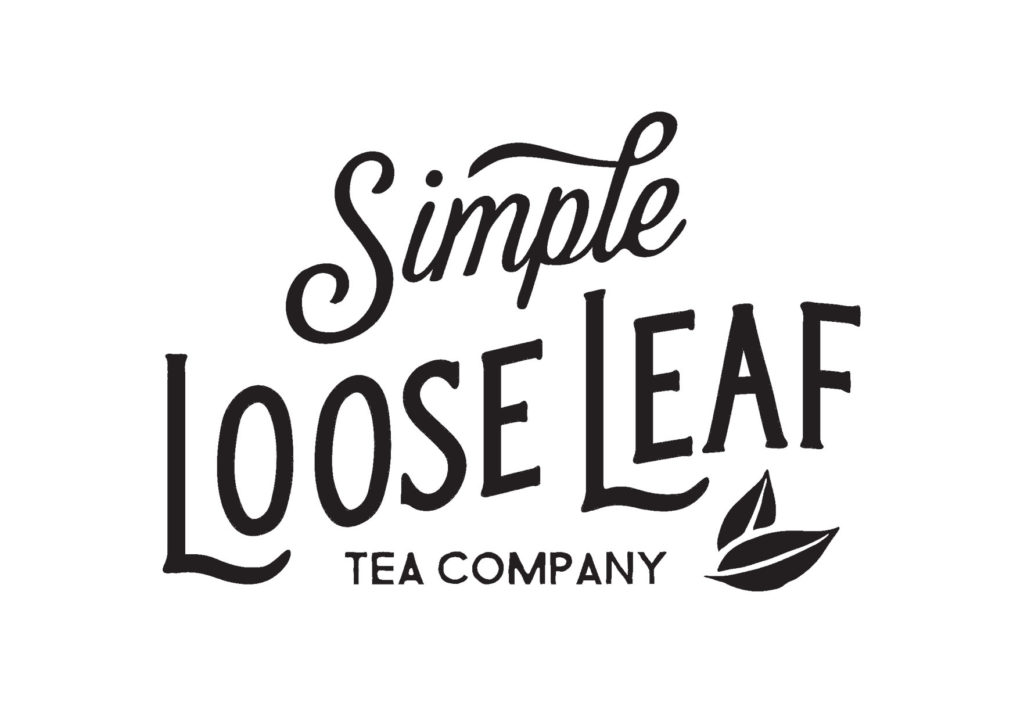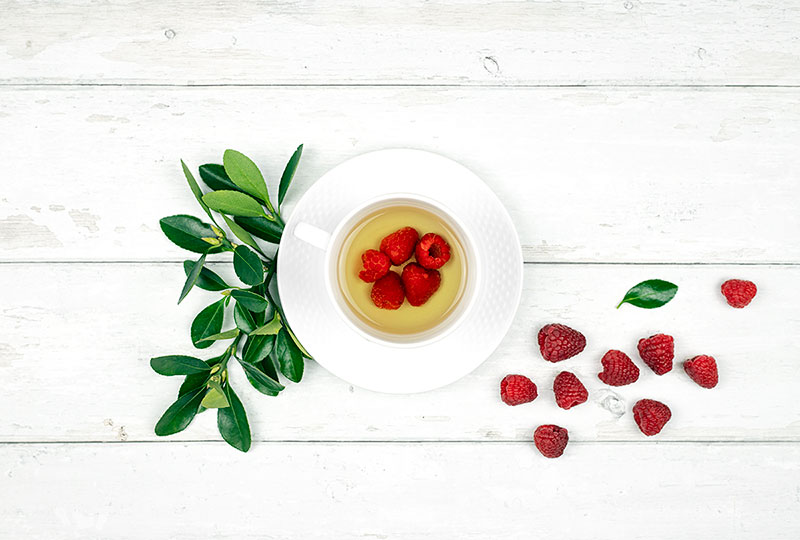Raspberry Leaf Tea Guide
Raspberries and raspberry leaf both make for a great cup of tea. While one has an irresistible juicy flavor, the other one may provide many potential benefits. Learn what is raspberry tea, how to brew a cup of raspberry fruit and leaf tea, and what science says about raspberry tea health benefits.
What is Raspberry Tea?
Raspberry tea is an infusion of raspberry fruit or raspberry leaves in hot water. The first one is usually referred to as fruit tea, while the other is called herbal tea. Raspberry plant or Rubus idaeus is very popular and widely available because it produces fruits that are delicious and nutritious.
Tea made with raspberries and raspberry leaf will have different flavor and provide different benefits. Expect more benefits from infusing raspberry leaves than raspberry fruits. In fact, raspberry leaf tea has been used traditionally for centuries[1].
Raspberry Leaf Tea Health Benefits
Raspberry leaf tea may provide a whole range of potential benefits, most of them relating to pregnancy and women’s health. Red raspberry leaf contains vitamins and minerals, tannins, flavonoids and other compounds[2]. It may provide antioxidant, anti inflammatory and antimicrobial activity[3] and potentially provide numerous benefits during and after pregnancy,[4] help relieve menstrual cramping, mild diarrhoea and throat inflammation[5]. Raspberry fruit contains anthocyanins[6], powerful antioxidant and pigment responsible for red and purple color of fruits and vegetables.
Traditionally, the main use of raspberry leaf tea infusion was during and after pregnancy, to “relieve nausea, increase milk production, increase uterine tone and ease labor pain[7]”. It’s often used to stimulate labor, but studies suggest it may not be as effective at inducing the labor as on improving the labor outcome and reducing the need of different medical interventions[8].
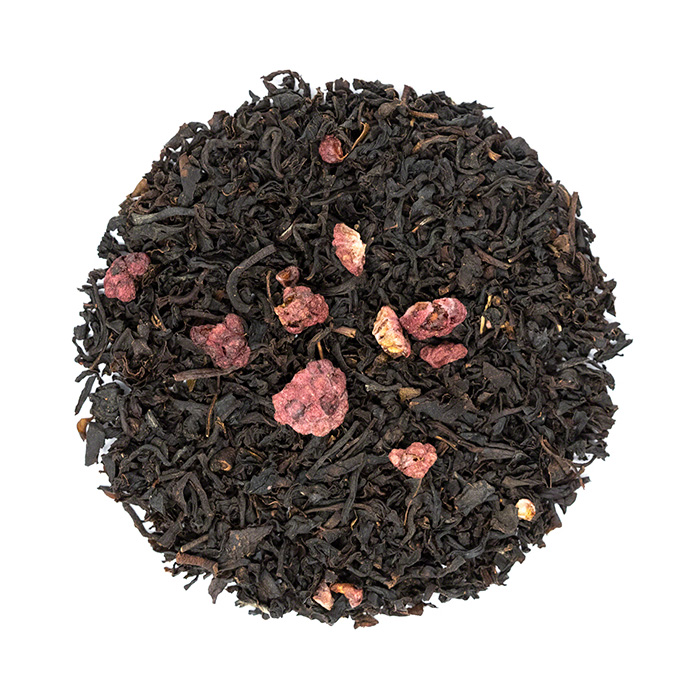
Simple Raspberry Black tea blend
Drinking Raspberry Tea
Before drinking raspberry leaf tea in pregnancy, always consult your doctor. Although it’s generally considered safer than other herbs commonly used during pregnancy[9], any risk, no matter how minor, should be avoided. It’s usually recommended to drink 1 to 3 cups of raspberry leaf tea a day when preparing for labor[10]. Many advise against drinking the tea during the first trimester and suggest start using it only after 32 weeks. However, there’s still not enough scientific data to support or reject claims those claims.
Flavor profile
Raspberry fruit tea and raspberry leaf tea will have a very different flavor. While the first one is juicy and fruity, sweet and sometimes slightly acidic, raspberry leaf tea doesn’t have a fruity note. It’s more similar to the flavor of black tea. Raspberry leaf contains tannins, and may be more or less astringent.
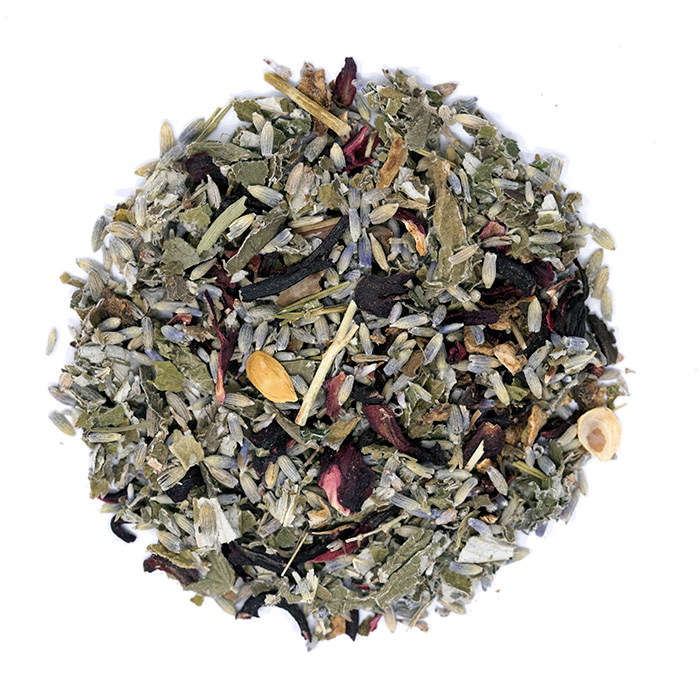
Lavender Raspberry herbal tea with red raspberry leaf
Caffeine content
Raspberry fruit tea and raspberry leaf tea are both caffeine free. However, if raspberries are blended with real tea leaves, for example green or black, the levels of caffeine will depend on the type of tea. Raspberry leaf tea is sometimes used in herbal blends too, but it’s almost never blended with real tea leaves. If you are concerned about caffeine content, always check the ingredients list before purchase.
How to Make Raspberry Tea
You can make raspberry fruit and leaf tea from both fresh and dried fruits and leaves. Dried raspberries are usually used in tea blends, while fresh ones can be added to pure tea leaves to give an intense, juicy fruit flavor.
To make raspberry fruit tea, use a handful of fresh fruits, wash them and steep in hot water together with a teaspoon of pure black or green tea leaves for 3-5 minutes. Raspberries blend well with mint, even ginger, and other zesty fruits, lime lemons and limes.
To make a cup of raspberry leaf tea, using dry leaf may be easier and sometimes safer. Use 1 teaspoon of dried tea leaves per cup of water. Bring fresh spring water to a boil and let it cool down for a few seconds. Steep the leaves for 5 minutes. Strain and add sweetener if needed.
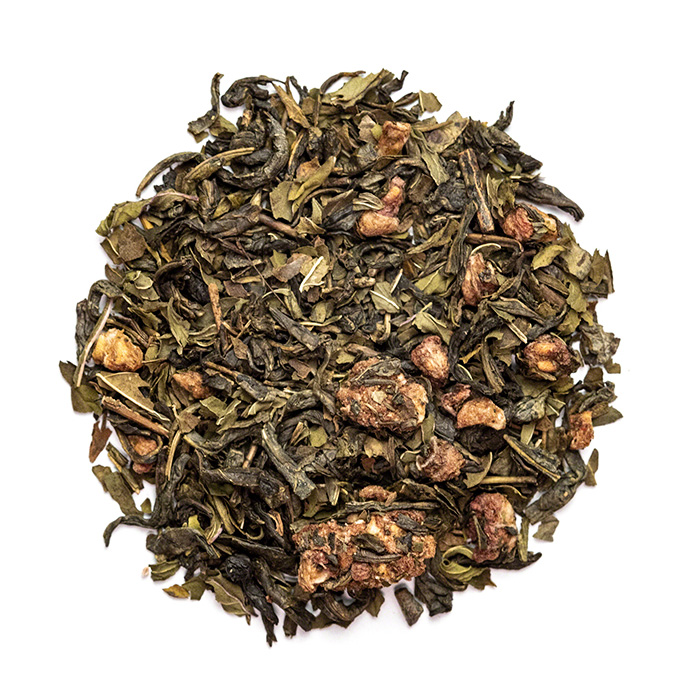
Raspberry Vanilla Mint green tea blend
Brewing Tips
Making a perfect cup of tea takes more than simply steeping tea leaves in hot water. The choice of water, utensils, and even your mood can all make a significant difference.
- Always choose fresh spring water
Water will have a big impact on color, flavor, and body. For example, if you use distilled water, tea may taste flat. On the other hand, tap water may give a muddy tea and significantly change the flavor.
- Use freshly boiled water
Always use freshly boiled water. Never boil water more than once. Re-boiling water may result in a flat tasting tea as well.
- Steep with fresh fruits
If you are brewing flavored or fruit raspberry tea, add in some fresh raspberries while steeping. They will add a strong, juicy note and make your cup taste super delicious.
- Don’t leave the infuser in the mug for too long
Herbal and fruity teas can become bitter or too strong too. Always follow brewing instructions if you want to enjoy the best tasting cup.
Disclaimer: This article is for informational purposes only. It’s not intended to replace medical advice, diagnosis or treatment. Every person is different and may react to different herbs and teas differently. Never use teas or herbs to treat serious medical conditions on your own. Always seek professional medical advice before choosing home remedies.
References:
[1] https://www.sciencedirect.com/topics/medicine-and-dentistry/red-raspberry-leaf
[2] https://www.ema.europa.eu/en/documents/herbal-report/final-assessment-report-rubus-idaeus-l-folium_en.pdf
[3] https://www.scielo.br/scielo.php?pid=S0101-20612020000100124&script=sci_arttext
[4] https://www.scielo.br/scielo.php?pid=S0101-20612020000100124&script=sci_arttext
[5] https://www.ema.europa.eu/en/documents/herbal-summary/raspberry-leaf-summary-public_en.pdf
[6] https://www.scielo.br/scielo.php?pid=S0101-20612020000100124&script=sci_arttext
[7] https://www.sciencedirect.com/science/article/pii/B9780123860071000234
[8] https://www.sciencedirect.com/science/article/pii/B9780443072772000180
[9] https://www.sciencedirect.com/science/article/pii/B9780443072772000180
[10] https://www.sciencedirect.com/topics/medicine-and-dentistry/red-raspberry-leaf
